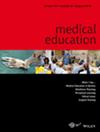Taking a definitional stance in health professions education scholarship
Abstract
Problem
Definitions are fundamental to the work of scholarship. Indeed, all scholarship has a definitional stance, even if that stance is not to use definitions. A definitional stance is the position scholars take regarding the use, interpretation or treatment of definitions within their work. In this paper, the authors explore definitional stances that shape inquiry in health professions education (HPE), from the formulation of research questions to the interpretation and dissemination of findings. Despite their ambient presence, definitional stances are rarely acknowledged in scholarly work, nor are they explicitly and consistently examined in peer review processes, critical appraisal, the methodological literature or in graduate education. As a result, definitional ambiguity and misalignment often goes unnoticed, and the coherence of scholarly discourse is undermined.
Definitional stances
The authors describe eight distinct types of definitional stances taken in health professions education. These range from adefinitional (avoiding any definitions) and rhetorical (adopting definitions as tools of persuasion) positions that resist fixed meanings, to realist, construct and pattern-based stances that embrace definitional coherence while allowing for ongoing inquiry and conceptual evolution. The authors illustrate the utility of this framework through a worked example (using the construct of professionalism), showing how different stances yield different understandings and scholarly pathways.
What this paper adds
There is no one ‘right’ definitional stance, but rather to promote thoughtfulness, reflexivity and transparency in how definition stances are taken and the implications thereof. The paper offers practical guidance to help scholars identify, articulate and justify their definitional stances in ways that are aligned with their epistemological commitments and research purposes. By making definitional stances more deliberate, transparent and open to discussion, HPE scholarship can make stronger knowledge claims based on a richer understanding of the kinds of knowledge that different stances afford, which has the potential to advance HPE in both principled and pragmatic ways.


 求助内容:
求助内容: 应助结果提醒方式:
应助结果提醒方式:


